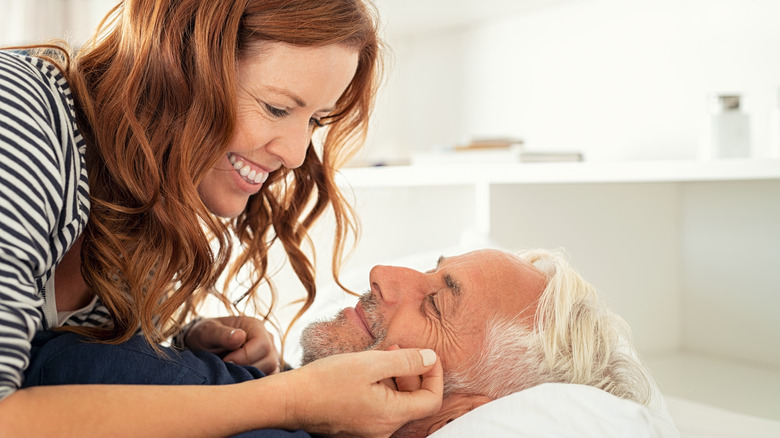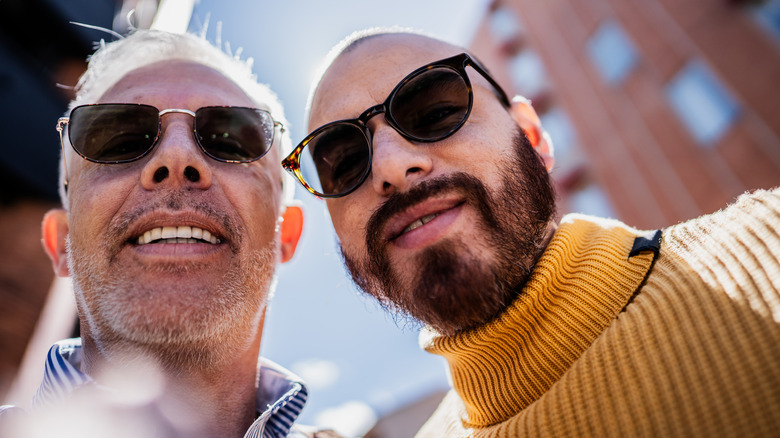The Ideal Age Gap For A Healthy Sex Life Isn't What You'd Expect
Experts have studied age gaps in relationships for a long time. The internet is full of research and commentary on what works, what doesn't, and why, and interest in the issue is further fueled by celebrities like Leonardo DiCaprio, who has serially dated women much younger than him. According to a 2023 report by the U.S. Census Bureau, the average age gap between cohabiting opposite-sex partnerships and marriages is 4.3 years and 3.7 years respectively. Male-male cohabitating or married couples average around a seven-year age gap, while female-female ones stand at 4.6 years for cohabiting partnerships and five for married couples.
While these statistics overlap with the conclusions of many other studies, it's not uncommon to see age gaps that are much larger. We're talking 10, 15, or more years apart. With questions about what age men lose their sex drive or the notion that younger people are more sexually active, it is not unusual to wonder if there's a perfect age difference at which intimacy would be greatest for both parties involved. Experts are careful not to answer in general terms, but what we do have at our disposal is some research. For example, a 2017 Australian study (not particularly focused on sex life) published in the Journal of Population Economics found that in heterosexual partnerships, couples with age gaps of one to three years, where the man was older than the woman, reported the highest level of relationship satisfaction. Larger age gaps saw a decline in this metric in the first six to 10 years of marriage. There is, however, more to the topic.
Age gaps and sex: A nuanced subject
An older 2012 study focused on couples from Hong Kong and published in The Journal of Sex Research noted a 2- to 4-year age gap (where the husband was older) as being the best in terms of sexual satisfaction for men. Despite such research, experts maintain that these disparities and how they affect your sex life cannot be spoken of in general terms. Speaking to POPSUGAR, Dr. Justin Lehmiller, psychologist and sex researcher at the Kinsey Institute, said, "People tend to project a lot of assumptions onto age-gap relationships, such as assuming that older partners are going to have lower libidos or that age differences necessarily create a dominant-submissive dynamic. However, the reality is that there's vast individual variability and different age-gap relationships might have very different sexual dynamics."
Your sex drive is influenced by a lot of factors. How you were brought up, your religious values, past sexual experiences, your views on sexual expression, hormones, medications, underlying diseases, and relational problems all come into play. While age can play a role, this doesn't always mean a disinterest in sex. A healthy sex life as you age is not uncommon. In fact, experts say age gaps can sometimes even enhance things. For example, Dr. Lehmiller said "sometimes it's the a younger person saying that being with an older, more experienced partner is great because they're sexually confident, good at sex, and invested in providing pleasure." Or there could be better compatibility, libido-wise, between an older and younger partner. Does this mean age gap is never a concern? Not quite.
Age gap and sex: When does it become a concern?
Sometimes, age gaps can cause problems in a couple's sex life. As explained by certified sex therapist and licensed psychotherapist Melinda DeSeta, libido-related concerns are something most pairs have to deal with, and large age gaps don't make things easy. "Adding in an age gap may enhance challenges with sex drives, type of sex, hormone levels, and sexual challenges," she wrote in a piece for Psychology Today. "Keep in mind that men typically reach their sexual prime in their 20s due to a spike in their testosterone levels. Women typically reach their sexual prime in their 30s and 40s."
While you might be tempted to say that age is just a number, there are some experts who disagree. Apart from health-related concerns like how menopause might affect your sex drive, other things like having different priorities, socializing in different circles, differences in emotional maturity, and even generation-based different views on sex and sexual expression can create distance between partners. Eventually, this can affect their bedroom time.
So, is there an ideal age gap for a healthy sex life? It might depend on your particular situation. As long as you have open conversations with your partner, you feel sexually seen and understood, and you are both willing to work at health hurdles or relational obstacles that come in the way of intimacy, then age might in fact, just be a number.



